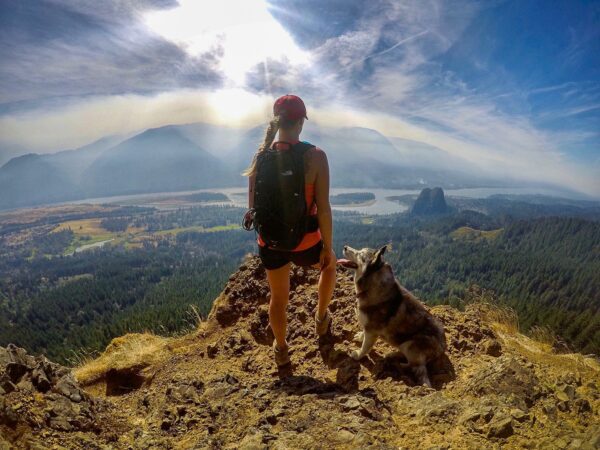
This week’s article is a re-Blog from The British Pilgrimage Trust by Dawn Champion.
A recent report into pilgrimage revealed that men in younger age groups are more likely to make these journeys alone, with women preferring groups of two to three. Often this is due to concerns about how safe women really are in rural isolation. Here, BPT’s Dawn Champion challenges some of the common perceptions about the safety of solo walking for both men and women, with some personal advice about how to use personal safety to enjoy the peacefulness of pilgrimage on your own.
In March, 2021, the body of Sarah Everard was found a couple of miles from my house. The awful events surrounding her murder sparked the all too familiar debate about women’s safety and their right to walk alone. Now, with the disappearance of Nicola Bulley the same questions are being asked.
Safer than you think
A large part of my role is out walking, on my own, in isolated areas. I get asked about the safety of solo walking a lot, almost entirely by women. Happily, it’s safer than you might think. I grew up in the countryside, at a time when it wasn’t unusual to let your under 11’s go out exploring with no parental supervision. As a teenager I’d often go off on a long walk on my own, without a mobile, a route plan or exit strategy. No tracking apps, just a bottle of orange squash.
In adulthood, I learned the hard way that assaults can happen to anyone (in my case, in a city centre during daylight hours). I came to understand that there were risks, but despite my experiences I have never felt vulnerable. A lot of women share my passion for solo walking, feeling comfortable in nature, away from the crowds, cars, and the head-down anonymity of city pavements. Others tend to feel much safer in urban areas. Our ideas of safe spaces and vulnerability tend to be affected by what we are used to.
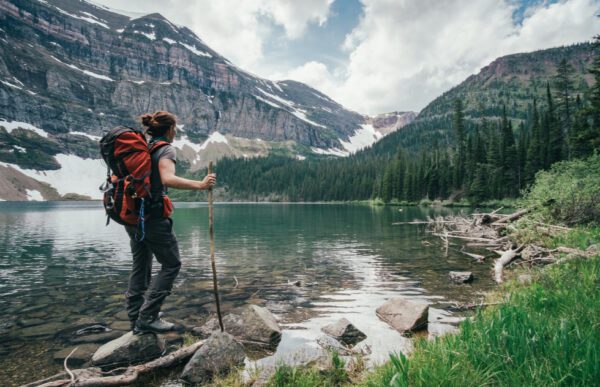 Men at Greater Risk
Men at Greater Risk
Some years ago I became a Personal Safety Trainer. This wasn’t about teaching self-defense, but the choices you can make to ensure you never need self defense. The reality check given by my trainers, the Suzy Lamplugh Trust, was eye-opening. I learned that it is men that are far more at risk of assault by a stranger than women. In fact, when we are out walking, we are all far more at risk from hazards such as road traffic, falls, and the elements, than strangers. We don’t let cars stop us from going to the shops. We don’t let dogs stop us from going to the park. The sense of control, of choice, and familiarity is what affects our perception of safety.
One of the pleasures of pilgrimage is that it brings you through a variety of landscapes. You will usually encounter remote rural places and busy towns and cities as part of the same journey. The approach to ensure your own safety, whether in the quiet woods or busy town, is the same. Men are not immune to the rural or urban hazards, and the safety toolkit is the same for everyone. The things women are used to having for protection, like rape alarms or taxis aren’t viable options for a solo journey on foot. That doesn’t mean we are vulnerable.
Preparation and Confidence
At first glance there seems to be a conflict between the need to be mindful of one’s safety and the desire to let go of everyday things, to truly engage with the pilgrim’s mindset. However, by being properly prepared, you can step out with confidence. You can have a much more fulfilling experience without worrying about your safety.
There are lots of blogs and kit lists to help you stay safe in the physical environment, and your personal safety is just another element in that toolkit. Thinking about these things in advance and knowing what you would do is not paranoia, it’s safe practice, just like learning to cross the road properly.
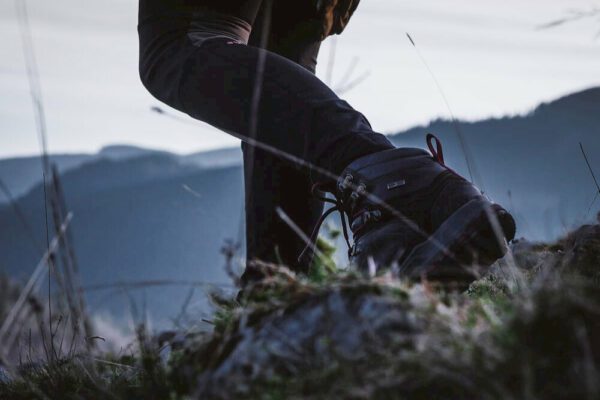
Dawn’s Personal Safety Tips
Prepare for your pilgrimage.
- Think about the kit you need to keep you safe in your physical environment, but also how far you want to travel that day, how long it will take, your onward travel plans or accommodation. Check your mobile network coverage along the route before you set out. Your network provider will have a map showing signal strength, and whilst these aren’t 100% reliable it is good to know how far you may need to travel to find a signal should you need to ask for help.
- Know where you are going, and where you are. Even if you are a great navigator, we can all get disoriented every now and then. Many people prefer to use paper maps or rely on waymarks and that’s fine – but it is beneficial to have the route downloaded on your phone to help you check your position and find a new shortcut should you need to.
- Tracing your movements. There are a lot of different tracking and safety apps available, so find one that works for you. You can leave details of your journey with someone, but if your plans change or they forget to check in with you it may not work as desired. I personally recommend Hollie Guard. It keeps you in control of your plans, rather than relying on someone remembering to follow up. It tracks your location and raises alerts. It’s free and there are additional upgrades for live monitoring too.
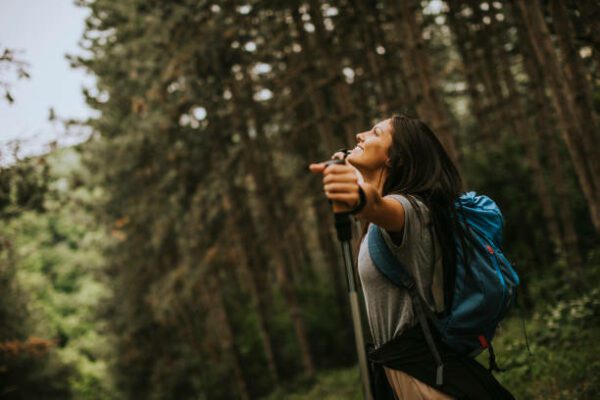
Belong on the path.
- Looking confident in your environment is an often underestimated way of discouraging unwanted contact with strangers. Hopefully by being fully prepared you will feel confident anyway, but if not just act confident. In rural areas, when you do encounter people make eye contact, say or nod hello, and walk with purpose.
- Remain calm. If the solitude or environment makes you uncomfortable (some people describe feeling this in the woods or around livestock) take a moment to ground yourself and stay calm. You always have choices on how to proceed. It’s ok to turn around and go back if you need to. Read up on how to behave safely around grazing animals and be aware of important local information like tide times.
- Carry a staff or stick. It is traditional for pilgrims, and it reduces your chance of having a fall, helps with overgrown paths, and delays fatigue. I find it also gives me a bit of a confidence boost, and unlike walking poles having only one means I can keep a hand free.
Act to avoid harm
- Make conscious choices. Pilgrimage is a physical practice, an action to reach a destination or transformation. As each step is a physical act to move onwards, so should we make clear decisions to avoid coming to harm.
- Act upon your instinct. If something or someone makes you feel uncomfortable, take action. It may be better to move on before a problem arises. Walking away quickly and confidently is a simple but effective way to prevent an incident.
- Your personal safety is always more important than your kit. Don’t overload yourself and carry only what is essential, to maintain your balance and avoid tiredness which can result in a fall. If someone tries to steal your possessions it is safer to give them up.
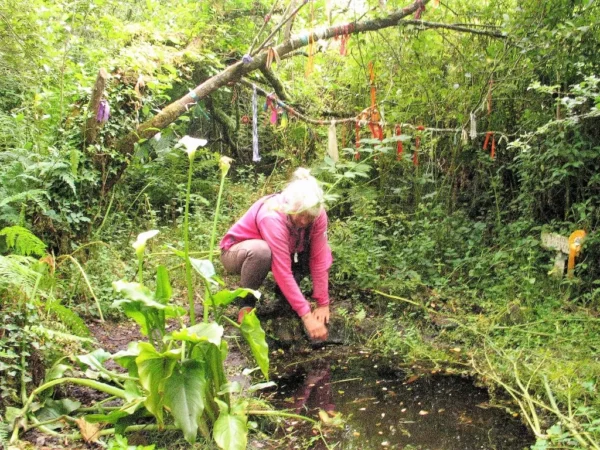
Vigilance is a virtue
- Never assume that something won’t happen to you, male or female, in town or country. Where we feel safe and familiar, that is when events can overtake us. When we feel vulnerable, we tend to be more alert, more open to taking action if needed, but we can signal that vulnerability to others. Pilgrimage can be a balance between deep contemplation and being open to the world around us. Choose your places of contemplation well; feeling safe will help you explore more deeply. By being observant, not only will you be able to detect any potential problems earlier, but you will also be rewarded with sights and sounds that could be easily missed which may help you find meaning in your journey.
